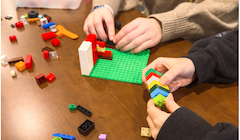Let’s Play! Engaging College Students in Mini Play Sessions, Perspectives, and Reflections
DOI:
https://doi.org/10.20343/teachlearninqu.13.15Keywords:
play in high education, play pedagogy, wellness pedagogy, wellness in higher educationAbstract
This in-progress study explores the integration of play sessions into higher education classrooms as a strategy to reduce student stress and enhance overall well-being. With increasing levels of stress and mental health challenges among college students, faculty often struggle with providing adequate support, particularly as most are not trained mental health professionals. Through initial play sessions conducted in two different courses, students reported significant shifts from negative emotions, such as stress and overwhelm, to more positive states of happiness, excitement, and calmness. This aligns with existing research suggesting that structured play and wellness activities can improve mental health and reduce stress. The study also considers the potential for play sessions to offer a low-barrier, creative approach for faculty to foster a more supportive and engaging learning environment. Over the next academic year, routine play sessions will be implemented across five courses, with pre- and post-surveys used to assess their impact on student stress levels, focus, readiness for class, and overall engagement. The findings from this study aim to contribute to the growing body of research on wellness pedagogy, offering insights on the long-term benefits of integrating play into higher education settings. Further exploration is needed to systematically gauge the levels of impact over time and determine the broader implications of this approach for student well-being and academic success.
References
Abrams, Zara. 2022. “Student Mental Health is in Crisis. Campuses are Rethinking Their Approach: Amid Massive Increases in Demand for Care, Psychologists are Helping Colleges and Universities Embrace a Broader Culture of Well-Being and Better Equipping Faculty to Support Students in Need.” Monitor on Psychology 53 (7) (October): 60.
Baik, Chi, Wendy Larcombe, and Abi Brooker. 2019. “How Universities Can Enhance Student Mental Wellbeing: The Student Perspective.” Higher Education Research & Development 38 (1): 1–14. https://doi.org/10.1080/07294360.2019.1576596. DOI: https://doi.org/10.1080/07294360.2019.1576596
Cavanagh, Sarah Rose. 2021. “How to Play in the College Classroom in a Pandemic, and Why You Should: Seven Ways to Lighten Things Up in Class that are Emotionally, Academically, and Pedagogically Sound.” The Chronicle of Higher Education, February 9.
Dobkins, Karen, Janna Dickenson, Debra Lindsay, and Taylor Bondi. 2023. “Changing the Landscape of Mental Health Among College Students: A Community Case Study of a Course on Learning Sustainable Well-Being.” Frontiers in Public Health 11. https://doi.org/10.3389/fpubh.2023.1175594. DOI: https://doi.org/10.3389/fpubh.2023.1175594
Duong, Huong T., Andrea Aebersold, and Matthew Mahavongtrakul. 2023. “Pedagogical Wellness: A New Direction in Educational Development.” Journal on Centers for Teaching and Learning 15: 4–29.
Eaton, Robert, Steven V. Hunsaker, and Bonnie S. Moon. 2023. “Improving Learning and Mental Health in the College Classroom.” Journal of College Teaching.
Field, Kim. 2023. “Professors Struggle with Demands to Tend to Students’ Mental Health.” The Chronicle of Higher Education, October 24. https://www.chronicle.com/article/professors-struggle-with-demands-to-tend-to-students-mental-health.
Gopalan, Maithreyi, and Shannon T. Brady. 2020. “College Students’ Sense of Belonging: A National Perspective.” Educational Researcher 49 (2): 134–37. https://doi.org/10.3102/0013189X19897622. DOI: https://doi.org/10.3102/0013189X19897622
Healthy Minds Network. 2023. “Annual Report on the State of Mental Health of College Students.” https://healthymindsnetwork.org/wp-content/uploads/2023/08/HMS_National-Report-2022-2023_full.pdf.
Howells, Kerry. 2014. “An Exploration of the Role of Gratitude in Enhancing Teacher-Student Relationships.” Teaching and Teacher Education 42: 58–67. https://doi.org/10.1016/j.tate.2014.04.004. DOI: https://doi.org/10.1016/j.tate.2014.04.004
Hrach, Susan. 2021. Minding Bodies: How Physical Space, Sensation, and Movement Affect Learning. Cambridge, MA: Harvard University Press.
James, Allison, and Stephen D. Brookfield. 2014. Engaging Imagination: Helping Students Become Creative and Reflective Thinkers. Hoboken, NJ: Wiley.
James, Allison, and Chrissi Nerantzi, editors. 2019. The Power of Play in Higher Education: Creativity in Tertiary Learning. Cham, Switzerland: Palgrave Macmillan. DOI: https://doi.org/10.1007/978-3-319-95780-7
Koeners, Maarten P., and Joseph Francis. 2020. “The Physiology of Play: Potential Relevance for Higher Education.” International Journal of Play 9 (1): 143–59. https://doi.org/10.1080/21594937.2020.1720128. DOI: https://doi.org/10.1080/21594937.2020.1720128
Lipson, Susan K., Sasha Zhou, Sara Abelson, Justin Heinze, Mathew Jirsa, Jasmine Morigney, Akilah Patterson, Meghna Singh, Daniel Eisenberg. 2022. “Trends in College Student Mental Health and Help-Seeking by Race/Ethnicity: Findings from the Healthy Minds Study, 2013–2021.” Journal of Affective Disorders 306: 138–47. https://doi.org/10.1016/j.jad.2022.03.038. DOI: https://doi.org/10.1016/j.jad.2022.03.038
Montessori, Maria. 1964. The Montessori Method. Translated by Anne Everett George. New York: Schocken Books.
Montessori, Maria. 1967. The Discovery of the Child. Translated by M. Joseph Costelloe. New York: Ballantine Books.
Murphy, Mary C., Maithreyi Gopalan, Evelyn R. Carter, Katherine T. U. Emerson, Bette L. Bottoms, and Gregory M. Walton. 2020. “A Customized Belonging Intervention Improves Retention of Socially Disadvantaged Students at a Broad-Access University.” Teaching + Learning Lab. Accessed from MIT Teaching + Learning Lab. DOI: https://doi.org/10.1126/sciadv.aba4677
Nails, Julianna G., Joseph Maffly-Kipp, Hilary L. DeShong, Sara E. Lowmaster, and John E. Kurtz. 2023. “A Crisis in College Student Mental Health? Self-Ratings of Psychopathology Before and After the COVID-19 Pandemic.” Psychological Assessment 35 (11): 1010–18. DOI: https://doi.org/10.1037/pas0001241
National Education Association (NEA). 2023. “The Mental Health Crisis on College Campuses.”
Parkin, John. 2024. “Playing with Playmobil: Supporting Undergraduate Conceptual Understanding in Environmental and Sustainability Education.” Anglia Ruskin University, April 5.
Project Zero. 2023. Pedagogy of Play Playbook: Educators as Play Designers. Harvard Graduate School of Education. https://pz.harvard.edu/sites/default/files/PoP%20Playbook.pdf.
Pope-Ruark, Rebecca. 2022. Unraveling Faculty Burnout: Pathways to Reckoning and Renewal. Baltimore: Johns Hopkins University Press. DOI: https://doi.org/10.56021/9781421445137
Saldaña, Johnny. 2016. The Coding Manual for Qualitative Researchers. 4th ed. Thousand Oaks, CA: Sage.
Saracho, Olivia N. 2021. An Integrated Play-Based Curriculum for Young Children. Abingdon: Routledge. DOI: https://doi.org/10.4324/9780429440991
Sailer, Michael. 2020. “Gamification for Learning: A Meta-Analysis.” Educational Psychology 32 (1): 77–112. DOI: https://doi.org/10.1007/s10648-019-09498-w
Stringer, Ernest P. 2014. Action Research. 4th ed. Thousand Oaks, CA: Sage.
Vygotsky, Lev S. 1978. Mind in Society: The Development of Higher Psychological Processes. Cambridge, MA: Harvard University Press.

Downloads
Published
Issue
Section
License
Copyright (c) 2025 Marna Winter

This work is licensed under a Creative Commons Attribution-NonCommercial 4.0 International License.






